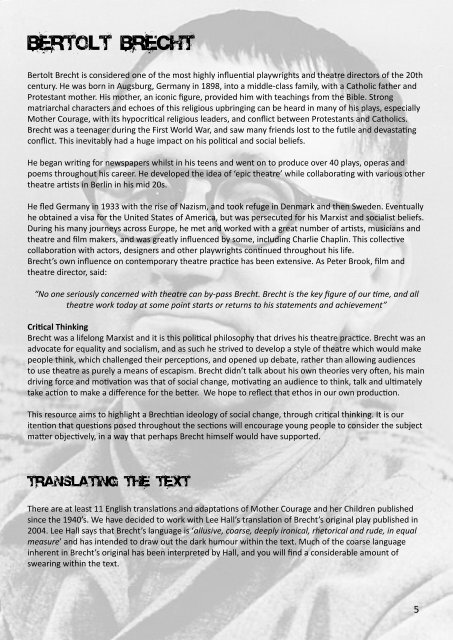Mother Courage Education Pack - Theatre Severn
Mother Courage Education Pack - Theatre Severn
Mother Courage Education Pack - Theatre Severn
Create successful ePaper yourself
Turn your PDF publications into a flip-book with our unique Google optimized e-Paper software.
Bertolt Brecht is considered one of the most highly influential playwrights and theatre directors of the 20th<br />
century. He was born in Augsburg, Germany in 1898, into a middle-class family, with a Catholic father and<br />
Protestant mother. His mother, an iconic figure, provided him with teachings from the Bible. Strong<br />
matriarchal characters and echoes of this religious upbringing can be heard in many of his plays, especially<br />
<strong>Mother</strong> <strong>Courage</strong>, with its hypocritical religious leaders, and conflict between Protestants and Catholics.<br />
Brecht was a teenager during the First World War, and saw many friends lost to the futile and devastating<br />
conflict. This inevitably had a huge impact on his political and social beliefs.<br />
He began writing for newspapers whilst in his teens and went on to produce over 40 plays, operas and<br />
poems throughout his career. He developed the idea of ‘epic theatre’ while collaborating with various other<br />
theatre artists in Berlin in his mid 20s.<br />
He fled Germany in 1933 with the rise of Nazism, and took refuge in Denmark and then Sweden. Eventually<br />
he obtained a visa for the United States of America, but was persecuted for his Marxist and socialist beliefs.<br />
During his many journeys across Europe, he met and worked with a great number of artists, musicians and<br />
theatre and film makers, and was greatly influenced by some, including Charlie Chaplin. This collective<br />
collaboration with actors, designers and other playwrights continued throughout his life.<br />
Brecht’s own influence on contemporary theatre practice has been extensive. As Peter Brook, film and<br />
theatre director, said:<br />
“No one seriously concerned with theatre can by-pass Brecht. Brecht is the key figure of our time, and all<br />
theatre work today at some point starts or returns to his statements and achievement”<br />
Critical Thinking<br />
Brecht was a lifelong Marxist and it is this political philosophy that drives his theatre practice. Brecht was an<br />
advocate for equality and socialism, and as such he strived to develop a style of theatre which would make<br />
people think, which challenged their perceptions, and opened up debate, rather than allowing audiences<br />
to use theatre as purely a means of escapism. Brecht didn’t talk about his own theories very often, his main<br />
driving force and motivation was that of social change, motivating an audience to think, talk and ultimately<br />
take action to make a difference for the better. We hope to reflect that ethos in our own production.<br />
This resource aims to highlight a Brechtian ideology of social change, through critical thinking. It is our<br />
itention that questions posed throughout the sections will encourage young people to consider the subject<br />
matter objectively, in a way that perhaps Brecht himself would have supported.<br />
There are at least 11 English translations and adaptations of <strong>Mother</strong> <strong>Courage</strong> and her Children published<br />
since the 1940’s. We have decided to work with Lee Hall’s translation of Brecht’s original play published in<br />
2004. Lee Hall says that Brecht’s language is ‘allusive, coarse, deeply ironical, rhetorical and rude, in equal<br />
measure’ and has intended to draw out the dark humour within the text. Much of the coarse language<br />
inherent in Brecht’s original has been interpreted by Hall, and you will find a considerable amount of<br />
swearing within the text.<br />
5


